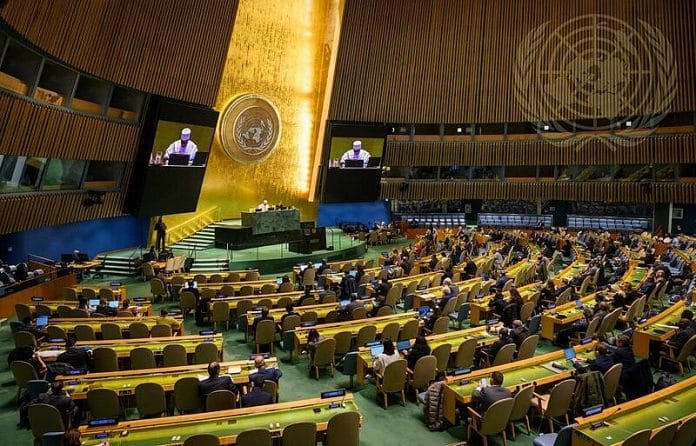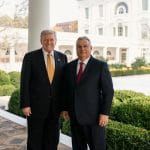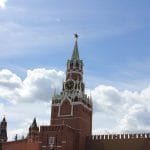Like clockwork, at the end of September, many of the world’s leaders converge on New York for the annual UN General Assembly (UNGA) session to present their national perspectives and passionately demand increased global cooperation. Media attention largely focuses on the “Annual High-level General Debate,” (September 22-29) also referred to as the “High-level Week,” where national leaders address the UNGA instead of dispatching the usual stolid ambassadors who normally represent their countries at UN Headquarters in New York. Formal proceedings for the UNGA80 program actually began on September 9 in New York, mostly procedural, but later in the month shifting to specific substantive topics.
As usual the world’s “instant experts” on global issues are all in attendance or commenting in print on the High-level part of the UNGA, the leaders’ speeches, multiple bilateral meetings or the star-studded New York side events. Their American host, President Donald Trump, who returned this year for his fifth UNGA address as the sitting U.S. President, did not let them down, challenging multilateralism from the centerpiece of the UN system, the General Assembly lectern.
The major headlines flowing from UNGA normally have less to do with the UN’s global, development and reform initiatives and primarily concern ongoing conflicts and major power interactions on the sidelines of UNGA meetings. That is certainly true for UNGA 80 even though two of the Security Council’s permanent members (the so called P5) were not represented by their respective heads of state again this year (Russia and China).
The UN80 Initiative
This year is the 80th UNGA meeting, a major anniversary for the UN, and the theme of the 80th session is “Better Together: 80 years and more for peace, development and human rights.”
A major thread of this session is the UN80 Initiative, launched by Secretary-General Antonio Guterres in March 2025. UN80 aims to make the UN more efficient, responsive, etc., through various workstreams on efficiencies and improvements; mandate implementation review; structural changes and programmatic realignment. It should be noted that with almost every major UN anniversary, the UN bureaucracy inevitably spins up a new reform initiative, so despite the high-minded preamble, the world is seeing very little “reform” that is actually new. The UN is essentially continuing its ongoing reform process, although the issue is pushed by different groups of member states in different periods with more or less urgency.
Where are we now? The UNGA adopted a resolution in support of the Secretary-General’s UN80 reform workstreams by consensus, which is normal and means all member states that cared to vote support the reform program. This is the single biggest institutional outcome of the UNGA80: according to the UN, it puts the member states firmly into the follow-up process (working groups, mandate reviews). However, implementation details remain to be negotiated, and this is where UN reform initiatives eventually run out of steam.
High-level Meetings of the 80th Session
The full listing of the session’s High-level meetings follows, with selected links to UN documentation included:
Opening of the 80th session: September 9
High-level Meeting to Commemorate the 80th Anniversary of the United Nations: September 22
Sustainable Development Goals (SDG) Moment: September 22
High-level International Conference for the Peaceful Settlement of the Question of Palestine and the Implementation of the Two-State Solution: September 22
High-level Meeting on the 30th Anniversary of the Fourth World Conference on Women: September 22
General debate: from September 23 to September, 27 and on September 29
Biennial Summit for a Sustainable, Inclusive and Resilient Global Economy, on the theme “Implementing commitments on financing development”: September 24
Climate Summit: September 24
High-level Meeting on the Prevention and Control of Noncommunicable Diseases and the Promotion of Mental Health and Well-being: September 25
High-level Meeting to Commemorate the 30th Anniversary of the World Program of Action for Youth: September 25
High-level Meeting to Launch the Global Dialogue on AI Governance: September 25
High-level meeting to commemorate and promote the International Day for the Total Elimination of Nuclear Weapons: September 26
High-level Conference on the Situation of Rohingya Muslims and Other Minorities in Myanmar: September 30
Much was said and still more written about the September 22 concluding meeting of the UN’s “High-level International Conference for the Peaceful Settlement of the Question of Palestine and the Implementation of the Two-State Solution,” when heads of state and other senior officials from 10 countries announced their recognition of an independent state of Palestine. The initiative and all related meetings have been boycotted by Israel and the United States, meaning the two-state project is going nowhere, unless Washington reconsiders. Co-sponsored by France and Saudi Arabia, the Conference is seen as a blatant attempt by the Europeans to re-insert themselves into the Middle East peace process, from which they have effectively been excluded for years and who in the last decades have been relegated largely to funding aid projects for the Palestinians in occupied territories, if agreed to by Israel and the United States. This UNGA session generated a lot of noise but did not change that basic equation. The one UNGA-specific change flowing from the controversy is that now Palestinian representatives can fully participate in UN sessions, even if the U.S. denies them visas for physical entry as occurred this year, requiring virtual attendance.
Running in parallel with the General Assembly events were UN Security Council meetings on September 23 on both Ukraine and Palestine, intended to give visiting heads of state and other High-level member state officials a chance weigh in on key security issues.
80 years on, geopolitics remains the core issue
Readers will recall that at this time last year many visiting world leaders had other issues on their minds, as the American election season was in full swing. Accordingly, in 2024 a number of leaders sought meetings with then-candidates Trump and Harris, either in New York or Washington, even though the Lebanon crisis was at its most dangerous point.
This year, the UNGA is seen as occurring at a delicate inflection point for multilateralism. Deep geopolitical rivalries, humanitarian crises, climate urgency, and internal strains in the UN system itself all loom large at a time when the U.S. commitment to the UN system remains in question.
Some significant visitors hurried through their UNGA speeches and headed directly for Washington, such as Turkey’s President Recep Tayyip Erdogan, as President Trump left New York after a brief stay and resumed his White House meetings on September 25. But this year there was not a massive flow of VIPS out of New York in the middle of the High-level debate.
Global leaders lay out competing worldviews, challenge multilateralism
Many world leaders used their time at the GA podium to critique the existing system, call for reform — especially of the Security Council, a never-ending debate — and reiterate commitments (or otherwise) to the rules-based order, sovereignty, and human rights. Some leaders — especially from the so-called Global South — accused the major powers of applying rules selectively. Discontent over inequality in burden sharing, perceptions of hypocrisy, and global economic imbalances were recurrent subthemes. Some speakers used the occasion to propose or reinforce candidacies for the next Secretary General (slated for selection in 2026).
Per UN custom, Secretary General Guterres delivered a framing address at the opening of the General Debate on September 23. His core message was clear — the UN must evolve, that multilateral institutions must be renewed, and that the world cannot afford to disinvest in cooperation. He emphasized that peace is a “first obligation” and warned that wars of “barbarity” are proliferating, pointing to crises such as Gaza, Ukraine, Sudan, and others. He said that the UN Charter and international law must not be optional, and reaffirmed a two-state solution on the Israel-Palestine dispute, while demanding a permanent ceasefire now, the immediate release of hostages, and full humanitarian access. Regarding broader crises, Guterres called for coordinated action in the Sahel, Myanmar, Yemen, and other hotspots.
As expected, U.S. President Trump’s remarks dove heavily into the “America First” worldview: emphasizing U.S. strength, sovereignty, firm border control, and deep skepticism about multilateralism and global institutions. He criticized the UN itself, labeling parts of its apparatus as ineffective and providing personal examples, while accusing it of issuing “strongly worded letters” instead of real action.
On climate and clean energy, Trump dismissed climate warnings, calling climate-alarmism a “hoax” and deriding renewable energy policies. He also attacked European migration policies and urged stricter border controls globally. In sum, Trump’s long and rambling address was less about contributing to global dialogue and more about signaling posture to a domestic base, effectively challenging the multilateral order from the floor of the General Assembly.
While in New York, Trump also met with a select group of Arab leaders and officials to lay out his plans for ending the war in Gaza and managing the reconstruction effort, as well as keeping Trump’s first-term “Abraham Accords” from collapsing. Little has been released officially but an announcement is expected in the coming days. However, the new U.S. 20-point framework for management of post-conflict Gaza transitional governance appears to reflect many months of focused staff work and consultations with Arab partners, and it should stand a fair chance of adoption, as compared to Trump’s “Gaza resort zone” plans announced last February and generally laughed off. Former UK Prime Minister Tony Blair has been mentioned in media reports as Washington’s preferred candidate to head the new Gaza transitional authority. Israeli Prime Minister Benjamin Netanyahu is set to meet with Trump on September 29 in Washington for further consultations.
Japan’s Prime Minister Shigeru Ishiba also delivered a well-structured UNGA address. He argued that the UN and Security Council are overdue for reform: increasing both permanent and non-permanent membership, and reconsidering veto power for new permanent members (he suggested a 15-year freeze on veto powers for newcomers). He criticized the inability of the Security Council to act decisively, pointing to Russia’s invasion of Ukraine as an example of paralysis in the face of aggression. He also emphasized “human security” and Japan’s development cooperation (especially in Africa), underlining values of dignity, capacity building, and multilateral engagement.
Brazil’s Luiz Inácio Lula da Silva’s speech generated media coverage for his defiance against externally imposed pressure and its defense of democratic norms. Lula strongly defended Brazil’s democratic institutions and framed the recent prosecution and conviction of Jair Bolsonaro for an attempted coup as reaffirmation: “authoritarianism is strengthened when we fail to act in the face of arbitrary acts.” Attempting to champion the “Global South,” Lula criticized unilateral sanctions, tariffs, and foreign interference, implicitly sending a message to the U.S. as tensions between the two countries had escalated.
Addressing the General Assembly on September 24, Ukrainian President Volodymyr Zelenskyy said the world is now experiencing “the most destructive arms race in history,” driven by the proliferation of military drones and the integration of artificial intelligence into warfare. He cited recent drone and airspace violations over NATO countries and urged world leaders not to underestimate the threat. He said that in practice, “weapons decide who survives,” and that security guarantees must be backed by real strength, not just well-meaning declarations. He warned that Russia, under President Vladimir Putin, aims to expand the current conflict beyond Ukraine’s borders. “Ukraine is only the first,” he said, warning that Moldova could follow. He urged international cooperation to stop funding and enabling Russia’s war, including ending trade ties that support Moscow.
Israeli PM Netanyahu’s defiant General Assembly speech on September 26 started off with a sizeable number of UN delegations walking out, a step usually read as a coordinated political gesture in the General Assembly Hall which can vary in size depending on the political climate. In a first, Netanyahu had positioned large numbers of speakers on the border with Gaza so his speech might be heard by some hostages and Hamas, and it was live streamed to phones in Gaza as well. After celebrating the defeat of Iran and its proxies, Netanyahu angrily accused countries opposing Israel and recognizing Palestine of “buckling under pressure” and some of antisemitism. He also promised that Israel will continue fighting until Hamas is fully defeated, “to finish the job.”







